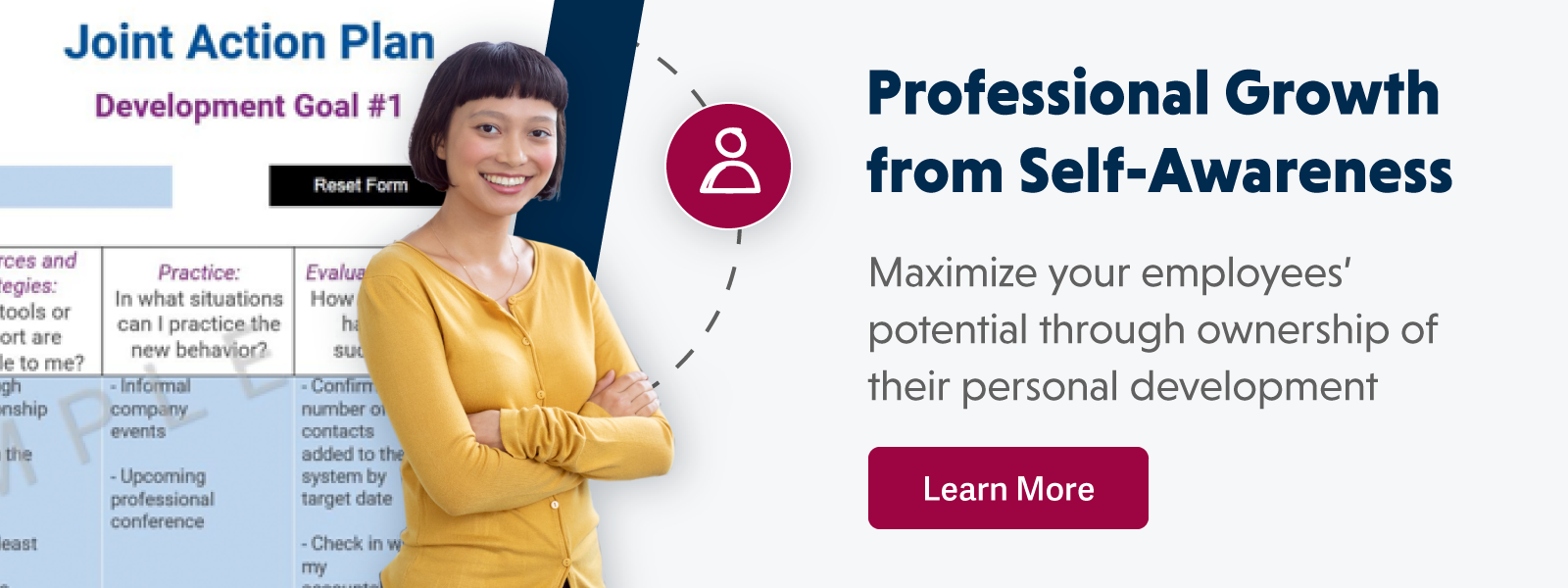Over the last couple of months, we’ve been analyzing the most crucial skills needed to develop self-management in your employees. To recap, self-management is not solely one innate skill; rather, it’s a coachable mechanism that works hand-in-hand with six key skills that contribute to employees and help them stay highly motivated and productive without constant supervision and perform exceptionally well. Self-management can be taught through coaching and the use of developmental solutions such as the Caliper Individual Developmental Guide — a tool that gives insight to employees to help them take charge of their own career growth through their current work.
In part 1, we discussed how composure and self awareness tag-team to boost employees self-management skills. And in part 2, we looked at the importance of adaptability and professionalism, and how each contributes to self-managed employees. Today, we’ll take a closer look at how taking ownership of your work and boosting eagerness to learn improves employees’ ability to self-manage.
Ownership of Work
This trait is what makes or breaks an employee’s overall work ethic and productivity level. Self-managed employees take ownership of their latest project — both the positive and negative aspects — and are willing to hold themselves accountable for the wins and losses brought on by their work. These employees are not afraid to admit when they’ve made a mistake, need help, or feel out of their depth, but are also eager to contribute when they believe they have something of value to offer. They take their work seriously, pride themselves on their successes, and learn from their missteps.
Are your employees self-managed? Find out how to exemplify #selfmanagement in your office and build an outstanding team of #leaders in the latest addition of @CaliperCorp’s 3-part blog series: Click To TweetHere are a few key tactics for how you can coach ownership in your employees:
- Hold Yourself and Employees Accountable: Being accountable means that in theory, you have full control over what happens in all situations in your everyday life, no matter what the severity entails. While this, of course, isn’t true for all situations, you are still 100% in control of how you react to them. Decide how you want to define your accountability philosophy at your company. This should be shared with your employees from day one and out.
- Control Your Fears: It’s human nature to fear many situations. To mitigate any work-related fears, start by organizing them and jotting down all the negative thoughts that frequent your mind. Next to each fear, write how much impact you have on that fear on a scale from 1-5 (1 being completely out of your control and 5 being fully controllable). Most likely, a lot of these fears will be a 4 or 5. Instead of dwelling on these, it’s now obvious to the employee that they’re in control of most of their fearful thoughts — motivating them to put in the extra work needed to get ahead of these fears.
- Always Start With the End Goal: All of our best work begins with a vision — the end goal. Detail out your end goal for a project before jumping into the nitty-gritty details of how you’re going to accomplish it. Whenever you feel like you’re losing touch with the original goal or find yourself lost while working on the project, take a step back and revisit the original goal you set. This will help your employees stay on track.
A Focus on Learning
Highly-experienced professionals may have seen a lot and experienced success over time, but there is no ‘correct’ way of completing a task, and new approaches are being implemented all the time. Due to the constantly evolving world we live in, it’s essential to reinforce learning opportunities at your workplace and offer your employees the opportunity to expand, think creatively, and continue to grow.
Are your employees struggling to take ownership of the work they’ve produced? Jot down these tips to develop self-management in your employees in @CaliperCorp’s latest blog: Click To TweetSelf-managed employees are hungry to learn more — even if it’s a new skill relevant to a different department. The more knowledge and skill they can take in, the better, more complex understanding they gain of their own work, and ultimately, the better their output of work will be. Additionally, they can jump in and help out in other areas of the company when assistance is needed, as well as share fresh perspectives with your team and others. Giving your employees several learning opportunities can promote a self-management culture by encouraging they take ownership of their professional growth.
If you want to help your employees become more you’re feeling unsure of who your top self-managed, provide them with a Caliper Individual Developmental Guide so they can discover additional ways to become self-starters and so you can develop a team of powerful leaders. Connect with our experts today to get started.


